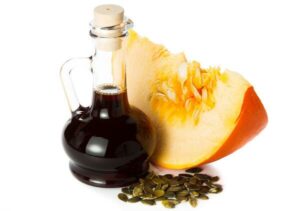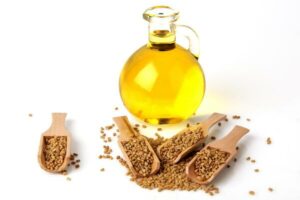 Taken daily as a health tonic, natural oils have the ability to provide protection and bring relief to enhance our health today, tomorrow and for the future. So let’s investigate fenugreek oil and pumpkin seed oil to see what benefits they can provide.
Taken daily as a health tonic, natural oils have the ability to provide protection and bring relief to enhance our health today, tomorrow and for the future. So let’s investigate fenugreek oil and pumpkin seed oil to see what benefits they can provide.
What is Fenugreek Oil?
Fenugreek has a long history as a medicinal plant. Ancient documents tell us that it was used in Ancient Egypt as part of the embalming process and to induce childbirth and stimulate lactation. Known as helba in Northern Africa, and methi in India, the oil is obtained from the seeds by way of cold-pressed extraction, thus retaining all of the nutrients and properties in a concentrated oil.
What is Pumpkin Seed Oil?
Native to North America (Mexico and Texas), pumpkins are one of the oldest domesticated plants, surpassing even crops such as maize, with the first recording dated around 7,500 BC. It was introduced to Europe by Christopher Columbus during the 15th century and by the 18th century Austrian farmers in Styria discovered that oil could be extracted from the seeds. In 1773, the Austrian Empress Maria Theresia, recognising the value of pumpkin seed oil for therapeutic usage, that the oil was too precious to be served as food and belonged to the chemists to produce ointments and wound dressings.
Why are Fenugreek Oil and Pumpkin Seed Oil recommended to Enhance Health?
Fenugreek oil contains a vast array of powerful compounds such as proteins, amino acids, alkaloids, saponins, coumarins, steroid sapogenins, and flavonoids, and the nutrients it provides include calcium, iron, potassium, vitamins A, B, B9 (Folic Acid), C, D and K. plus fatty acids such as oleic acid (omega 9), linoleic acid (omega 6), linolenic acid (omega 3), palmitic acid, stearic acid, arachidic acid, gadoleic acid and behenic acid.
Meanwhile, pumpkin seed oil is also a rich source of vitamins, minerals and essential fatty acids, including calcium, iron, magnesium, phosphorus, potassium, zinc, vitamins C and E, Linoleic acid (omega-6 and omega-3 fatty acids), in addition to carotenoids (also known as antioxidants), tocopherols, and sterols.
It is the rich source of compounds contained in these oils which give them their distinct health advantages. But is one better than the other? Both are worthy contenders to being your daily tonic to provide overall health benefits, but one may be better suited considering your own particular needs.
Detoxify, Boost and Protect the Body 
Fenugreek contains high levels of antioxidants, together with anti-inflammatory properties, to help rid the body of harmful free radicals, protecting against protein, DNA and lipid damage, and helping to protect the body against oxidative stress and certain chronic diseases such as diabetes, cancer, Alzheimer’s disease and a weakened immune system. Meanwhile the vitamins and nutrients boost the body’s natural immune system, preparing the body to fight common infections, viruses and afflictions. In fact fenugreek is known to be immunoregulatory. Additionally, by reducing aluminium toxicity it can also inhibit brain disease. The antibiotic, antimicrobial and antiviral properties of fenugreek oil help to reduce and protect against viral and bacterial diseases, and are great for oral health, helping to protect against gum diseases such as gingivitis and periodontitis and eliminating bad breath. Furthermore, fenugreek contains a powerful compound called trigonelline that boosts the brain and, according to research, can slow age-related memory loss, in addition to reducing the risk of conditions such as Alzheimer’s and Parkinson’s.
Pumpkin seed oil is high in antioxidants to protect against inflammation and chronic disease, which if left untreated can lead to many chronic, degenerative and often debilitating health issues including cancer, diabetes, cardiovascular disease and cognitive decline. Its antioxidant agents can cleanse the body of the harmful molecules left in the body following digestion and after exposure to harmful environmental impacts, thus limiting cell damage, and the harmful effects of oxidation. The array of nutrients contained in pumpkin seed oil help to boost the immune system by offering wound healing, antibacterial and antiviral properties amongst others.
Improved Heart Health
Fenugreek oil fortifies the heart muscles, allowing blood to travel easier, helping to control blood pressure, in addition to lowering cholesterol and blood sugar levels. It helps to reduce the risk of atherosclerosis, heart attacks, blood clots and strokes.
Equally, pumpkin seed oil can enhance heart health by improving circulation and reducing the risk of clots, in addition to lowering high blood pressure, plus cholesterol and blood glucose levels, protecting against atherosclerosis, strokes, heart attacks and heart disease.
Enhanced Liver Health 
Polyphenolic compounds in fenugreek oil have demonstrated liver-protective benefits, in particular protecting the cells and function of the liver against the toxic effects of alcohol and preventing alcohol-induced liver damage.
Various studies have indicated that pumpkin seed oil is hepatoprotective. It helps to cleanse the liver of harmful toxins, removes heavy metals, small formations and sand. Pumpkin seed oil activates the liver cells, improving their biochemical processes and improves regeneration. Studies have shown pumpkin seed oil is able to protect against hepatitis A and cirrhosis from secondary viral infections, halt the progression of cirrhosis, improve dyslipidaemia and prevent the progression of non alcoholic fatty liver to steatohepatitis, and reduce nonalcoholic steatohepatitis (NASH) and alcohol-induced liver toxicity.
Anticancer Potential
Fenugreek has demonstrated anticancer properties due to a compound called protodioscin. In studies it has inhibited the growth of of breast and pancreatic cancer cell lines, plus reduced tumour cell growth. More research is required.
Pumpkin seed oil has demonstrated anticancer properties and has been linked with a reduced risk of breast, colon, lung, prostate and stomach cancer. The lignans and flavones in the oil have been shown to have a positive effect on hormone-dependent tumours, and studies suggest that pumpkin seed oil can play a role in breast cancer prevention or treatment. A large observational study on postmenopausal women, noted the reduced risk of breast cancer.
The effect of pumpkin seed oil on prostate health is well studied and documented, confirming its ability to deter prostate cancer. Meanwhile a 2018 study carried out by the Manipal College of Pharmaceutical Sciences in India, showed promising results in lowering the risk of colon cancer.
Test-tube studies to date have been very promising regarding the anticancer properties and have demonstrated that it can kill certain cancer cells such as breast cancer cells and lymphoma, although more research is needed.
Benefits For men 
Fenugreek oil improves testosterone levels in men, counteracting infertility by improving sperm count, libido, mood and energy levels. Studies have shown that compounds contained in fenugreek called furostanolic saponins increase testosterone levels in male subjects. Men showed an increase in strength during their resistance training and demonstrated a boost in their sex drive by over a quarter. Testosterone deficiency, also known as hypogonadism can impact on health, and conditions such as diabetes and obesity are associated with low levels of testosterone regardless of age. Over 39% of men over the age of 45 are estimated to suffer from reduced testosterone levels which affect libido, energy levels, bone health, mood, cognitive function and more. One study showed increased testosterone levels by up to 46% in 90% of the participants, showing improvements in libido, sperm count and mood, thus allowing fenugreek to confirm itself as a scientifically proven aphrodisiac.
Pumpkin oil has a host of benefits for men. It is particularly effective for strengthening the health of the prostate gland, ensuring a healthy prostate function and protecting against the risk of prostate problems such as: benign prostate hypertrophy (BPH), a noncancerous condition causing an enlarged prostate that impairs urinary function and can cause an inability to urine, a weak urinary flow or even loss of bladder control; chronic nonbacterial prostatitis; chronic bacterial prostatitis, a bacterial infection which is common in older men; and prostate cancer.
In one study, 47 men suffering from BPH took pumpkin seed oil daily for 12 months and reported reduced symptoms including increased urinary flow, plus an overall a better quality of life. Another study concluded that pumpkin seed oil improved maximal urinary flow rate.
Pumpkin seed oil is packed with zinc which stimulates the body to produce more testosterone, thus boosting sperm health and increasing sperm production and fertility, in addition to helping to build more muscle. Studies have confirmed the ability of pumpkin seed oil to improve fertility and erectile function.
Pumpkin seeds were traditionally used to combat erectile dysfunction, and studies have confirmed the ability of pumpkin seed oil to counteract erectile dysfunction, thanks to its composition. Pumpkin seed oil contains the amino acid arginine which is converted into nitric acid within the body, and improves blood flow. An erection is triggered by the nervous system, and causes an increase in the nitric oxide levels in the arteries and muscle of the penis. The dilation of the arteries fills the erectile tissue with blood which is held in place by groups of muscles. Arginine also improves sperm motility. The well known chemically produced product for the treatment of erectile dysfunction works in a similar way to arginine.
Pumpkin seed oil also contains tryptophan, an amino acid which produces serotonin, the happiness hormone that improves sexual desire and function, and magnesium which helps to calm the nerves.
Benefits For women 
Fenugreek has a long history as a medicinal plant, in particular regards women’s health.
A naturally occurring compound called diosgenin is found in fenugreek, which mimics the oestrogen hormone that the body produces, helping to balance hormonal imbalance and regulate the menstrual cycle. It can reduce menstrual cramps during PMS, whilst alkaloids contained in fenugreek help to block pain sensory receptors to the brain. It is also an excellent aid for women experiencing menopause symptoms. Studies have reported significant reductions in hot flashes, one of the major symptoms of the menopause, and it can further help to balance the hormones reducing mood swings. Fenugreek has long been accredited with boosting breastmilk production in lactating women and various studies have confirmed its ability to significantly increase milk production, and subsequently accelerate the rate of weight gain in babies.
Pumpkin Seed Oil can help to restore hormonal balance and promote normal ovulation, thus regulating menstruation and also improving fertility. It helps to reduce the symptoms of PMS, dysmenorrhea and menopause. A study on postmenopausal women confirmed that a daily intake of the oil showed that there was a marked decrease in hot flashes, headaches and joint pain.Pumpkin Seed oil is also said to block dihydrotestosterone (DHT), which is the hormone responsible for hair loss, most noticeably in menopausal and postmenopausal women.
The wound healing and anti-inflammatory properties of pumpkin seed oil are helpful for the treatment of gynaecological diseases such as vaginitis, cervical erosion and endocervicitis. Pumpkin seed oil is also rich in beta-carotene which is found in high concentrations within the ovaries. A lack of beta-carotene in the body in general will leave inadequate amounts in the ovaries which will be less equipped for fighting off infections. Beta-carotene is also essential for the normal growth of the tissue type found in the vagina. Pumpkin seed oil can also inhibit the fungus Candida albicans, responsible for mucous membrane infections such as thrush and vaginal yeast infections
Fenugreek Oil Benefits for Digestive System
Fenugreek oil has a long history as a digestive aid, It. Fenugreek oil is often included in treatments for ulcerative colitis.
Long used as a digestive aid, studies have proven that fenugreek reduced the symptoms of heartburn sufferers, with the effects in line with those of antacid pharmaceutical products. It keeps the digestive system functioning smoothly, supporting a healthy microbial balance in the gut, improving digestion, and reducing stomach pain, bloating, upset stomach, constipation, colic and inflammation of the stomach (gastritis). It helps to keep acidity and ulcers at bay and covers the walls of the stomach and intestines with a protective mucus which cleanses them from toxins and also has a healing effect on existing gastric and duodenal. It is known to be an excellent dietary addition for patients suffering from IBS and ulcerative colitis, and is recommended to be taken directly after a meal.
Pumpkin seed oil is full of zinc, plus omegas 3 & 6, and has wound healing and anti-inflammatory properties to help protect and soothe the digestive tract, as well as enabling better absorption of nutrients. It helps to reduce symptoms of irritable bowel syndrome when taken regularly, and normalises the acidity of the stomach. Researchers in S N Pradhan Centre for Neurosciences, University of Calcutta, confirmed that pumpkin seed oil can protect against peptic ulcers.
Benefits for Joint Inflammation 
Fenugreek oil has the ability to reduce inflammation both internally and externally. Chronic inflammation is believed to be a key factor in many chronic and degenerative diseases including arthritis. As a strong antioxidant, fenugreek oil can help to relieve oxidative stress and the resulting inflammation. Linolenic and linoleic acids found in fenugreek oil can significantly reduce joint pain and inflammation associated with arthritis, as confirmed in scientific studies. Furthermore, it has the ability to block pain receptors to the brain thus further reducing pain and discomfort. For the relief of joint pain, muscle pain, and muscle stiffness due to degenerative inflammatory disease or sports injuries, take internally and apply the oil as a massage (if preferred may be mixed in equal measures with a carrier oil such as jojoba, almond oil, etc). A massage with fenugreek oil will reduce pain and inflammation, relax tense muscles and calm the nervous system. A few drops may also be dropped on a warm damp towel to make a poultice and applied directly to the area to treat any pain and swelling.
Studies have shown that pumpkin seed oil has a positive effect on arthritis, relieving pain and inflammation, and its effect on arthritis has been likened to that of a popular arthritis drug but without the adverse side-effects
Improving Urinary Tract Function
Fenugreek helps to improve renal function, increasing antioxidant protection, reducing oxidative stress, inhibiting lipid peroxidation and significantly reducing calcification processes in the renal tissue. It helps to increase the number of red blood cells in the body and thereby retains a good supply of well oxygenated blood to the kidneys which, coupled with its diuretic properties, assists in removing toxins and excess fluid and sodium from the body, keeping the kidneys healthy, preventing the formation of stones, and reducing fat content in the body.
The urinary tract, made up of the kidneys, bladder and urethra, plus the duct connecting the bladder to the exterior opening, can benefit greatly from regular consumption of pumpkin seed oil. 
Pumpkin seed oil helps to improve kidney function, and cleanse the kidneys, cleaning them of sodium and toxins, and lowering the risk of chronic kidney disease. Moreover it can help to prevent kidney stones, clumps of crystal-forming substances including calcium and uric acid that form in concentrated urine, by lowering calcium levels in the urine and preventing the accumulation of uric acid in the body. According to scientists, the risk of kidney stones is significantly reduced by the daily consumption of potassium, which is found in high levels in pumpkin seed oil.
Creatinine, a waste product of muscle metabolism, is usually discharged by the kidneys via urine. However in the event of a kidney impairment, extra creatinine can build up in the blood causing symptoms such as nausea or vomiting, muscle cramps, fatigue, changes in urination frequency, bloating or fluid retention, and high blood pressure. Pumpkin seed oil, due to its diuretic effect, can help increase urine output and eliminate excess creatinine.
Pumpkin seed oil can help to maintain healthy bladder function by strengthening the muscles of the pelvic floor – the muscles that stretch from the coccyx to the pubic bone and serve as sphincter muscles, controlling the opening and closing of the urethra. Studies regarding the impact of pumpkin seed oil on an overactive bladder have confirmed that it can produce a significant reduction in symptoms including daytime and night-time urination, urgency to urinate, and urinary incontinence. Participants noted improvements within 6 weeks, greatly increasing their quality of life. The oil is also effective for nocturia (frequent night-time urination).
Interstitial cystitis is a chronic bladder condition producing recurring discomfort or pain in the bladder or surrounding pelvic region, often accompanied by irritated bladder walls, more frequent urination (often several times during the night), the sudden intense need to urinate, and bloating. Pumpkin seed oil, due to the presence of arginine, can help to open the blood vessels, increase circulation and reduce inflammation in the pelvic region, thus reducing symptoms.
Another study regarding the use of pumpkin seed oil on an irritated bladder confirmed a reduction in bladder symptoms such as bladder pain and pressure and burning while urinating. A study investigating the effect of pumpkin seed oil on cystometrography – pressure studies of the bladder – noted an increase in bladder capacity and decreased urination frequency.
Lowering Blood Sugar
Fenugreek is a traditional remedy for diabetes, and studies have upheld this belief, showing that it can help to address insulin resistance and regulate blood sugar levels for both type 1 and type 2 diabetes. Regular intake of fenugreek oil stimulates the production of insulin by cells within the pancreas, and inhibits the activity of enzymes which break down sugar into glucose, slowing down the absorption of sugar in the gastrointestinal tract. It is also useful for non-diabetics and those in prediabetic stage, having a positive effect on insulin sensitivity, and improving glucose tolerance. A three year study confirmed that the use of fenugreek before a meal for prediabetics significantly reduced the likelihood of developing diabetes.
Pumpkin seed oil can protect against the onset of diabetes and help to regulate blood sugar levels for those already in the throes of the disease. Studies have confirmed the anti-diabetic properties of pumpkin seed oil: One study showed that the consumption of pumpkin seed oil helped to maintain pancreas functioning, improving glucose levels and lowering fat levels. Another found that pumpkin seed oil naturally increased insulin production, reducing insulin dependence, whilst yet another study showed that pumpkin seed oil improved blood glucose and insulin sensitivity.
Benefits for Skin 
Fenugreek oil will effectively cleanse, tone, exfoliate and moisturise the skin. As a humectant it will draw moisture into the skin to prevent dryness, whilst its antibacterial and antifungal properties will deter acne and pimples. Meanwhile the anti-inflammatory properties will deal with skin inflammation such as eczema, dermatitis and allergies, as well as relieving blemishes, boils, and bites. Fenugreek oil also contains strong antioxidant properties, and helps in the growth and repair of the skin cells, thus combatting and deterring wrinkle formation, dark spots and scarring. Regular use of fenugreek oil will leave the complexion more toned, rejuvenated, blemish-free, and simply glowing with health.
Pumpkin seed oil contains fatty acids and vitamin E which provide excellent antioxidant protection for the skin. Applied topically this oil will support and nourish the skin, reducing inflammation, stimulating collagen production and the growth of new cells, retaining elasticity, promoting healing, soothing and smoothing the skin, alleviating skin conditions such as eczema and psoriasis, and improving damage and the appearance of fine lines, wrinkles and age spots.
Benefits for Hair
Everyone wants a full head of healthy, shiny hair and fenugreek oil can make this a reality. Healthy hair begins with a healthy scalp, and fenugreek can prevent dandruff and scalp conditions, and reduce inflammation in the hair follicles which can be responsible for hair loss. The composition of the oil helps to repair damage to the hair shaft, nourish the hair follicles and induce blood circulation to promote growth. It is also believed that certain compounds in the oil may interact with DHT (dihydrotestosterone) – a chemical in the body which attaches itself to the hair follicles and causes hair loss – slowing its ability to attach. Studies regarding the impact of fenugreek oil on hair growth have shown positive results, with one study over a six month period demonstrating significant growth and strength to the hair in over 80% of participants, whilst another study regarding the oral intake of fenugreek oil for hair loss and hair fall showed a positive outcome for all participants. Overall, fenugreek oil strengthens the hair, reduces hair shedding, increases hair growth, density, smoothness and elasticity, and improves the texture and lustre of the hair.
Pumpkin seed oil is full of important nutrients, vital for great hair health. It will nourish and moisturise the hair follicles, promoting thickness, health and growth. There have been several studies regarding the impact of pumpkin seed oil on hair growth. In one study of 76 men, as published in Complementary and Alternative Medicine, the men who took the pumpkin seed oil for 24 weeks saw increased hair growth of 40%, compared to just 10% in the placebo group. The increased growth rate was accredited to the oil inhibiting 5-alpha-reductase, one of the major causes of male or female pattern baldness.
Another study on women over a 3 month period, showed increased hair growth, whilst another study showed that topical application improved growth after just three weeks.
Culinary Usage
Fenugreek is an important ingredient as a spice (dried seeds) and herb (dried leaves) in India, incorporated into curries and chutneys, whilst its fresh leaves are used in salads. The bittersweet flavour, reminiscent of maple syrup and burnt sugar, marks its use as an ingredient for desserts, and as the main flavouring for artificial maple syrup. You may also add the oil to honey for a delicious sauce for desserts, or add to salad dressings, dips, tea, milk, smoothies and shakes.
Pumpkin seed oil is very versatile and lends itself to both sweet and savoury dishes. Drizzle it over pasta, soup, rice, roast vegetables, fish, roast chicken or grilled meats. Use in salad dressings or dips. You can even pour some over ice cream or fresh fruit. Pumpkin seed oil has a very low smoke point (120°C and is not suitable for roasting or frying as you will lose many of the important nutrients, and the oil can also become bitter and unpleasant tasting.
Additional Benefits of Fenugreek Oil:
Respiratory Relief 
Traditionally used as a respiratory aid in Ancient times, fenugreek oil can help to alleviate the symptoms of a cold, flu or pulmonary disease, as well as seasonal allergies, due to its strong anti-inflammatory and expectorate properties. It helps to calm inflammation, reducing coughing, and has been shown to improve lung function for people with mild asthma. The expectorate properties will break up phlegm and help relieve congestion of the airways. As well as being taken internally, the oil can also be used in steam inhalation to clear the airways, and reduce any associated headache. Additionally, Fenugreek oil can help to remedy a sore throat by adding a little to some warm water and using as a gargle.
Weight Loss
Taking fenugreek oil daily boosts the metabolism and helps to shed any excess pounds. It is rich in galactomannan, a healthy polysaccharide responsible for the breakdown of fat and sugar metabolism in the body, and can trigger the burning of adipose tissue, including stubborn belly fat. Studies have shown that it can inhibit fat accumulation, therefore encouraging the body to burn excess fat. As a diuretic fenugreek oil can further assist by dispelling water retention.
Additional Benefits of Pumpkin Seed Oil:
Improves Mental Wellbeing 
Pumpkin seed oil can help to alleviate anxiety and depression, plus boost the mood. This is most likely accredited to the fact that pumpkin seed oil is high in the amino acid tryptophan, the precursor to serotonin, the happiness hormone, which stabilises the mood and induces a feeling of wellbeing. Low levels of serotonin are linked with depression, anxiety, and sleep trouble. The oil is also rich in zinc, and low levels of zinc have been associated with mood disorders, in addition to psychiatric diseases such as depression, Alzheimer’s, and Parkinson’s disease. Studies with children and adults suggest that pumpkin seed is an effective treatment for depression. A study into social anxiety found that pumpkin seed oil greatly reduced the participants’ anxiety levels. Since pumpkin seed is a good source of both tryptophan and magnesium it can also help to promote better sleep.
Anthelmintic Benefits
Pumpkin seed oil has a long tradition of being used for the treatment of internal parasites in humans and livestock. Recent studies have confirmed its anthelmintic properties which are due to the presence of an amino acid called cucurbitacin. Cucurbitacin works by effectively paralysing the parasites so that they lose their grip on the lining of the intestines or gallbladder, are unable to reattach, and are effectively flushed out during a bowel movement.
So there you have it, the main benefits of fenugreek oil and pumpkin seed oil. In some ways there benefits are very similar, but their unique composition means that the actual benefits differ slightly, with one being more beneficial for one thing than the other and vice versa. They do also, of course, provide extra benefits which the other does not. Both oils have the ability to improve your health when taken as a daily tonic, the only decision is which one is best for your individual needs. Add one to your diet today and start to reap the rewards for your long-term health.


